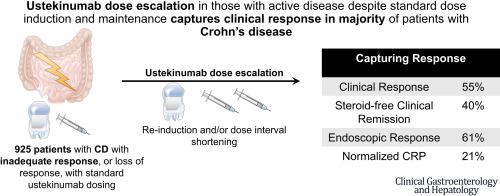Clinical Gastroenterology and Hepatology ( IF 11.6 ) Pub Date : 2021-10-08 , DOI: 10.1016/j.cgh.2021.10.002 Joseph Meserve 1 , Christopher Ma 2 , Parambir S Dulai 1 , Vipul Jairath 3 , Siddharth Singh 4

|
Background & Aims
Patients with Crohn’s disease (CD) treated with ustekinumab who experience inadequate response, or loss of response after standard induction and/or maintenance dosing may benefit from dose escalation. We conducted a systematic review and meta-analysis examining the effectiveness of reinduction and/or dose interval shortening of ustekinumab in patients with active CD despite standard induction and maintenance.
Methods
Through a systematic literature search through March 31, 2021, we identified 15 cohort studies in 925 adults with CD with inadequate response or loss of response to standard dose ustekinumab, underwent dose escalation (reinduction and/or dose interval shortening to <8 weeks), and reported rates of achieving clinical response, corticosteroid-free clinical remission, endoscopic response, and/or remission. We calculated pooled rates (with 95% confidence intervals) using random effects meta-analysis and examined factors associated with response to dose escalation through qualitative synthesis of individual studies.
Results
On meta-analysis, 55% of patients (95% confidence interval, 52%–58%) with inadequate response or loss of response who underwent ustekinumab dose escalation achieved clinical response, with moderate heterogeneity (I2 = 57%). Approximately 61% of patients were able to achieve endoscopic response, including 29% who achieved endoscopic remission. Dose interval shortening alone recaptured response in 57% patients. No consistent factors associated with response to dose escalation were identified on qualitative synthesis.
Conclusion
In real word settings, ustekinumab dose escalation was effective in achieving response in patients with CD with inadequate response, or loss of response to standard dose induction and/or maintenance therapy.
中文翻译:

乌司奴单抗重新诱导和/或剂量递增治疗克罗恩病的有效性:系统评价和荟萃分析
背景与目标
使用优特克单抗治疗的克罗恩病 (CD) 患者如果在标准诱导和/或维持剂量后反应不足或失去反应,可能会受益于剂量递增。我们进行了系统回顾和荟萃分析,检查了在活动性 CD 患者中重新诱导和/或缩短乌特克单抗剂量间隔的有效性,尽管进行了标准诱导和维持。
方法
通过截至 2021 年 3 月 31 日的系统文献检索,我们确定了 925 名 CD 成人患者的 15 项队列研究,这些研究对标准剂量乌特克单抗反应不足或失去反应,并接受了剂量递增(重新诱导和/或剂量间隔缩短至 <8 周),并报告了临床缓解率、无皮质类固醇临床缓解率、内镜缓解率和/或缓解率。我们使用随机效应荟萃分析计算了汇总率(95%置信区间),并通过个别研究的定性综合检查了与剂量递增反应相关的因素。
结果
荟萃分析显示,55% 的反应不足或反应丧失的患者(95% 置信区间,52%–58%)在接受乌特克单抗剂量递增后获得了临床反应,具有中等异质性(I 2 = 57%)。大约 61% 的患者能够获得内镜缓解,其中 29% 获得内镜缓解。仅缩短剂量间隔就能使 57% 的患者重新获得缓解。在定性合成中没有发现与剂量递增反应相关的一致因素。
结论
在现实环境中,乌特克单抗剂量递增对于反应不足或对标准剂量诱导和/或维持治疗失去反应的 CD 患者有效实现缓解。











































 京公网安备 11010802027423号
京公网安备 11010802027423号